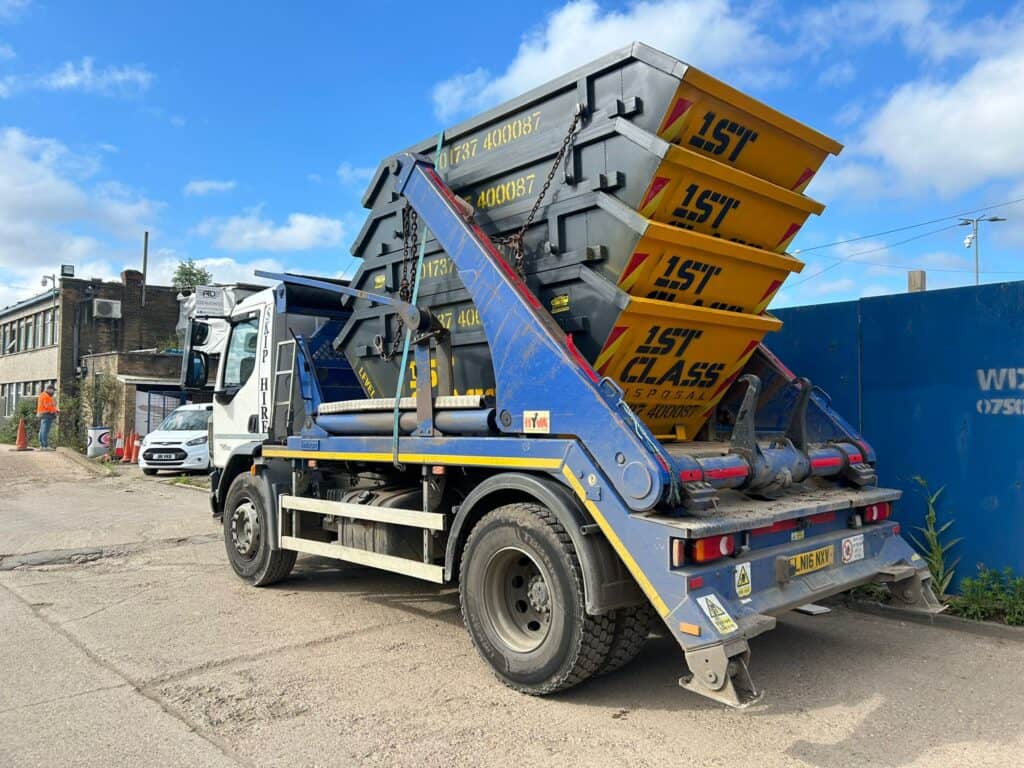Just as important as clearing your clutter, understanding the do’s and don’ts of skip hire ensures a smooth experience for you as a London resident. From selecting the right size skip to following local regulations, this guide will equip you with the vital tips to avoid common pitfalls. Knowing what can and cannot be disposed of is vital, as missteps may lead to additional charges or legal trouble. Let’s examine into the key guidelines that will make your skip hire process efficient and hassle-free.
Understanding Skip Hire Regulations
For anyone considering skip hire in London, it’s vital to understand the regulations that govern this service. Each council has specific rules regarding skip placement, size restrictions, and load limits that you must adhere to. To ensure you’re fully informed, check out these Five Expert Tips for Skip Hire Loading and Placement in London.
London-Specific Rules
Behind the general skip hire regulations, London has specific rules that can affect your project. Areas like Westminster and Camden have additional requirements such as obtaining a special parking suspension or applying for a skip permit for your chosen location. Ignoring these local rules can lead to fines or removal of your skip.
Licensing and Permits
Among the many aspects of skip hire, securing the correct licensing and permits is imperative for a hassle-free experience. Depending on your project’s nature and your skip’s placement, you may need to apply to your local council for a permit.
Hire a skip for your project but ensure you obtain the necessary permits and have a valid license before it is delivered. Skips placed on the road typically require a permit, while those located on private property do not. Applying for these permits often comes with a small fee, but failing to do so can result in your skip being removed by local authorities. Always verify the requirements with your council to ensure compliance and a smooth skip hire experience.
Choosing the Right Skip Size
It’s important to choose the right skip size for your project to avoid excessive costs or overspending. Each type of project presents its own waste management requirements, and selecting a skip that meets your needs ensures efficient disposal. Consider the volume and type of waste you’ll be generating before making a decision, as this will help you save both time and money in the long run.
Mini, Midi, and Maxi Skips
Skip sizes vary, with mini, midi, and maxi options available for different needs. Mini skips are perfect for small projects, such as garden clean-ups or DIY jobs, while midi skips accommodate moderate waste from small renovations. For larger undertakings, such as construction work, maxi skips provide the necessary capacity to manage substantial volumes of waste effectively.
Estimating Waste Volume
Choosing the right skip involves accurately estimating your waste volume. Assessing how much waste you’ll generate can prevent potential issues and additional costs. Consider the types of materials you will dispose of, such as rubble or garden waste, as this can help determine the right size skip. If you’re unsure, consult with a skip hire company, as their expertise can guide you in making a suitable choice based on your project specifics.
At the outset, take the time to evaluate your waste volume carefully. Start by examining the area from which you are clearing waste; look at the items you intend to dispose of, measuring larger items if necessary. Group similar materials together to get a better estimate of space they may fill within a skip. Being cautious in this estimation process is important, as underestimating waste can lead to additional trips or fines for overflow. By planning ahead, you can ensure you select the most suitable skip size for your project.
Do’s of Skip Hire
One of the key do’s of skip hire is to ensure that you First-Time Skip Hire? What You Must Know before you start your project. This includes understanding your waste requirements, choosing the right size skip, and checking local regulations regarding skip placement. By being informed, you’ll make the experience smoother and more efficient.
What to Load in Your Skip
Along with knowing what items are allowed in your skip, it’s vital to differentiate between general waste and restricted materials. You can dispose of garden waste, household items, and construction debris, but items like hazardous waste, electronics, and tyres must be disposed of properly.
When to Schedule Your Skip Delivery
Skip hire activities should be planned around your project timeline. Schedule your skip delivery at a time that coincides with the start of your clearance work, ensuring maximum efficiency.
The timing of your skip delivery is vital; scheduling it before you begin your cleanup ensures you can toss waste away immediately. Take into account the size of your project and the availability of street space, particularly if you need a permit on public roads. This planning helps avoid unnecessary delays and keeps your workspace tidy.

Don’ts of Skip Hire
After booking your skip, it’s necessary to understand what not to do. Avoid overfilling the skip or placing it on public roads without the necessary permits, as this can lead to fines and delays. Furthermore, never dispose of hazardous materials, which can attract legal penalties and pose safety risks. Adhering to these guidelines ensures a smooth skip hire experience.
Prohibited Items
One of the key aspects of skip hire is being aware of the prohibited items that cannot be disposed of in your skip. This typically includes items such as: batteries, tyres, electrical appliances, and hazardous waste like chemicals or asbestos. Ignoring these rules can lead to hefty fines and potential legal issues. Always check your skip hire provider’s guidelines for a comprehensive list.
Common Mistakes to Avoid
Against popular belief, hiring a skip comes with its own set of challenges, and you should steer clear of typical mistakes. One significant blunder is underestimating the size of the skip you need. Selecting a skip that is too small can lead to additional costs, as you may require a second skip to accommodate your waste. Furthermore, not checking local regulations regarding skip placement is another common pitfall. This could result in fines or having your skip removed.
Avoid these errors by thoroughly assessing your waste volume before hiring a skip. Always choose a size that comfortably accommodates your rubbish without the need for overfilling. This not only keeps your area tidy but also ensures you stay within legal limits. Additionally, it’s wise to verify any local regulations regarding skip use in your area. Understanding these key details will help make your skip hire as satisfying and efficient as possible.
Cost Factors in Skip Hire
Not every skip hire service is the same, and understanding the cost factors involved can save you money. When considering skip hire in London, keep in mind the following:
- Size of the skip
- Duration of hire
- Type of waste
- Permit requirements
- Delivery and collection charges
Any lack of awareness regarding these factors can lead to unexpected expenses.
Pricing Structures
Along with knowing the cost factors, it’s important to understand the different pricing structures that providers may use. Most companies offer fixed rates based on the skip size and hire period, while others may charge per weight of the waste. Familiarise yourself with both types to choose the best option for your needs.
Hidden Costs to Watch For
Skip hire can sometimes come with unexpected fees, so it’s wise to look out for potential hidden costs.
A common pitfall is the extra charges that may arise from exceeding weight limits, or penalties for disposing of prohibited items. Furthermore, if you require a skip placed on public land, you may need to pay for a permit, which isn’t always included in the initial quote. Always read the terms and conditions carefully to ensure you are aware of any additional fees that might apply.

Eco-Friendly Skip Hire Practices
Your choice of skip hire can significantly impact the environment. Opting for eco-friendly practices not only helps in managing waste effectively but also contributes to a greener London. By selecting a provider that prioritises recycling and sustainable disposal methods, you ensure that your waste is handled responsibly, reducing landfill contributions and promoting a more sustainable future.
Recycling and Waste Management
Above all, effective recycling and waste management are important components of eco-friendly skip hire. Ensure that your skip hire company actively sorts and recycles waste materials. By doing so, they can divert a significant portion of waste from landfills, which not only conserves space but also reduces harmful emissions.
Sustainable Choices
Along with recycling, opting for sustainable choices in your skip hire can make a substantial difference. Look for companies that utilise energy-efficient vehicles and methods to minimise their carbon footprint. Additionally, you can choose skips made from recyclable materials, promoting a circular economy where waste is effectively reused.
To enhance your eco-friendly efforts, select skips that facilitate easy sorting and recycling of specific materials such as metals, plastics, and organic waste. By actively participating in this process, you help minimise landfill impact and support local recycling initiatives. By making these informed choices, you contribute to a more sustainable waste management system in London, ultimately benefiting your community and the environment as a whole. Choose wisely, and make a positive impact!
Final Words
Considering all points, as a London resident, it’s vital to follow the skip hire do’s and don’ts to ensure a smooth and compliant experience. By choosing the right skip size for your needs, obtaining the necessary permits, and properly disposing of waste, you contribute to a cleaner environment. Avoid overloading your skip, placing it on public highways without permission, and disposing of prohibited items, as these can lead to fines and disruptions. Following these guidelines can lead to a more efficient and manageable waste removal process, benefitting both you and your community.
FAQ
Q: What items are prohibited from being placed in a skip?
A: Certain items cannot be disposed of in skips due to health and safety regulations. This includes hazardous materials such as asbestos, chemical waste, batteries, electrical appliances, medical waste, and tyres. Additionally, any items that could pose a risk to landfill workers or the environment should not be included. Always check with your skip hire provider for a comprehensive list of prohibited items.
Q: How do I determine the right size skip for my needs?
A: Selecting the appropriate skip size depends on the volume and type of waste you intend to dispose of. Skips come in various sizes, typically ranging from 2 cubic yards (mini skip) to 40 cubic yards (roll-on roll-off skip). Assess the amount of waste you have and consult with your skip hire provider, who can offer guidance on the best size based on your specific requirements.
Q: Are there specific regulations regarding skip placement on public streets in London?
A: Yes, there are regulations regarding the placement of skips on public roads. A skip placed on a public street requires a permit from your local council, which ensures that it is positioned safely and does not obstruct traffic. Your skip hire company can often assist with this process. Always ensure the skip is clearly marked and fencing or lights are used to enhance visibility, especially at night.
Q: Is it acceptable to overload a skip?
A: Overloading a skip is not permitted and can lead to safety hazards, including spillage during transportation. Skips should only be filled to the top edge, without exceeding the fill line indicated on the skip. If you have more waste than can fit safely within the skip, consider hiring an additional skip or alternative disposal methods to comply with regulations and ensure safe handling.
Q: How long can I keep a skip on my property?
A: The duration you can keep a skip largely depends on your agreement with the skip hire company. Typically, skips can be rented for a period ranging from a few days to several weeks. If you require the skip for a longer time, communicate your needs with the hire company as they may offer extensions or additional charges for extended usage. Always ensure to clarify the terms of the hire before agreeing.



